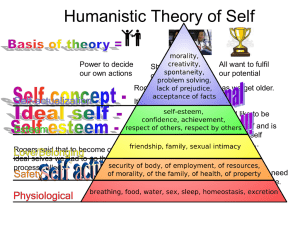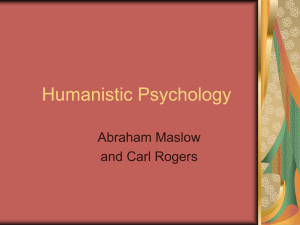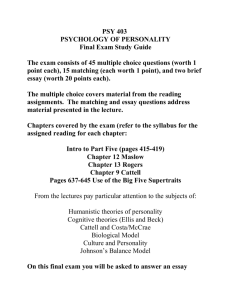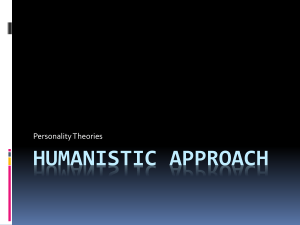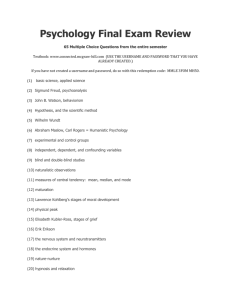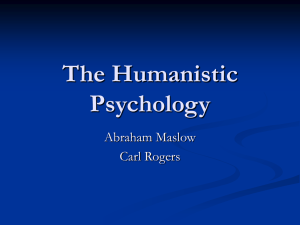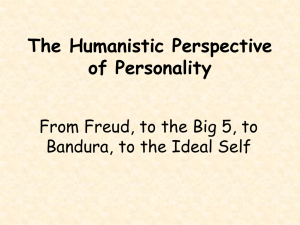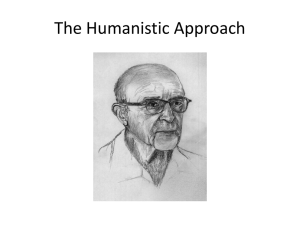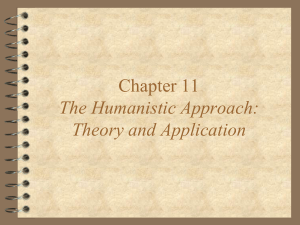Your personality is in part shaped by if you receive unconditional
advertisement
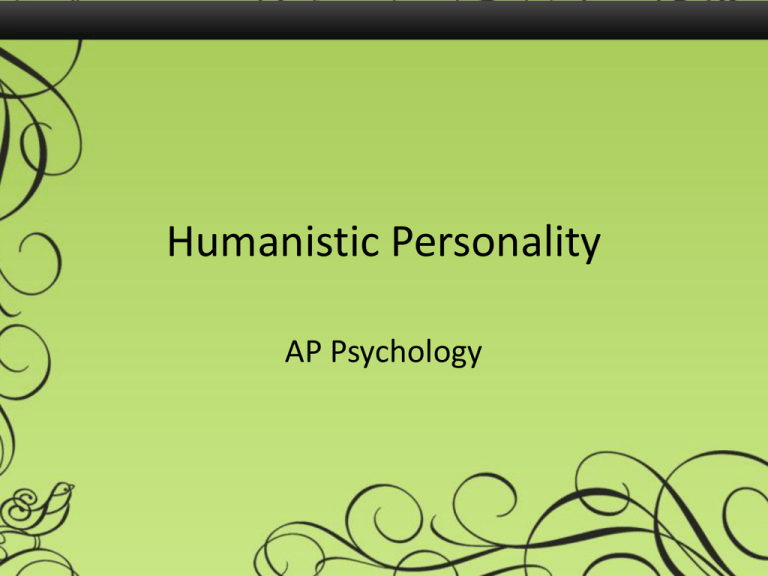
Humanistic Personality AP Psychology Consider this…. • People have the ability to accomplish great things when they put their minds to it. • Did you ever think that you could do something that could change the world? • Doing something important takes DETERMINATION and HARD WORK. In the humanist view… • People have the freedom and will to change behavior (you choose/create your personality). We have Free Will! • Humans CAN think and control their urges. • Our environment is less important to shaping our personality….our self-concept is MORE important in shaping our personality. Humanistic Psychology • Rebellion against: Behaviorism and Psychoanalytical Psychology. • Humanistic Psych= emphasizes personal growth and the achievement of maximum potential by each unique individual. Two important Humanists scholars • 1. Abraham Maslow (1908-1970) • Deliberately set out to create a “third force” in psychology….challenge to Freud and Skinner. • Maslow’s theory/research is based on examining healthy, creative, self-actualizing people. Not based on the studies of disturbed individuals. Maslow: Hierarchy of Needs • We must satisfy our basic needs before we can try to meet higher-level needs. How we meet these needs can help explain our personality and how we obtain personal growth. Self-Actualized People • Are….. – Self-aware and self-accepting – Great deal of spontaneity – Loving and caring – Not paralyzed by other’s opinion – Involved in FEW deep relationships, do not engage in superficial relationships – They transcend the environment rather than just coping with it.. Maslow believed… • To become self-actualized, a person MUST first satisfy the four preceding levels (hierarchy of needs). • Most humans only make it to the third level (Belongingness and Love needs) 2. Carl Rogers (1902-1987) Person Centered Perspective • Studied to be a Christian pastor. • Left theology school primarily because he believed that “People CAN NOT sin”….we are all basically good people, but sometimes we make bad decisions. • Psychologists should call the people they are counseling “Clients” not “patients”. Carl Rogers • Many people suffer from a conflict b/w what they value in themselves and what they believe others value in them. • We struggle to become more complete and perfect. • Your personality is composed of the SELF (humanist version of the ego)= your image of who you are and what you value in your self. Carl Rogers • The SELF is acquire gradually over the years by observing how other people react to you. • We all have a Self-Concept= our perceptions and beliefs about our selves. • Phenomenal Field= our psychological reality based on perceptions and feelings. Subjective. Healthy personality • To become a FULLY FUNCTIONAL INDIVIUAL [unit the self (what I am striving to be) with what I truly am], we need Unconditional Positive Regard= love or support given to another person with no conditions attached Carl Rogers • According to Rogers, unfortunately most people receive CONDITIONAL POSITIVE REGARD (CPR)= examples…”I’ll love you if you behave well”….”do well in school and I will pay attention to you”. • With CPR, Love is based on conditions • Your personality is in part shaped by if you receive unconditional positive regard or conditional positive regard. Standard critiques of Humanistic Theories • Pros: upbeat approach/positive/healthy individuals. • Pros: focus on present and future possibilities • Pros: Focus on the individual • Cons: Difficult to empirically study, concepts are unclear??? • Cons: Western approach
